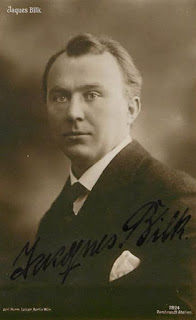Penelope
She studied in Marseille and Paris and made her debut in 1900 at the Opéra-Comique in Paris. In 1906 she sang there in the Paris première of G. Puccini’s ‘’Madama Butterfly’’ as Kate Pinkerton, in later performances she appeared as Suzuki. Since 1912 she started to perform at the Opéra-Comique in principal roles: as Tosca, Mignon, Santuzza in ‘’Cavalleria Rusticana’’, Anita in ‘’La Navarraise’’, Traviata, Musetta in ‘’Le Bohème’’ and as Mallika in ‘’Lakmé’’. In 1910 she appeared there in the premiere of ‘’Le Mariage de Télémaque’’ of Claude Terrasse. She made guest appearances at the opera houses of Lyon, Geneva, Nice and Marseille and Monte Carlo, where in 1909 she sang the part of Wellgunde in Nibeklungenring and Stéphano in ‘’Roméo et Juliette’’. In 1923 she appeared at the Théâtre Fiametta in Paris in modern works. During the 1920’s she founded a private society. In 1927 at the Théâtre Fémina in Paris she appeared with them in the premiere of ‘’Angélique’’ of Jacques Ibert. She was married the famous French tenor Lucien Muratore (1878-1954), but later separated.
She studied in Marseille and Paris and made her debut in 1900 at the Opéra-Comique in Paris. In 1906 she sang there in the Paris première of G. Puccini’s ‘’Madama Butterfly’’ as Kate Pinkerton, in later performances she appeared as Suzuki. Since 1912 she started to perform at the Opéra-Comique in principal roles: as Tosca, Mignon, Santuzza in ‘’Cavalleria Rusticana’’, Anita in ‘’La Navarraise’’, Traviata, Musetta in ‘’Le Bohème’’ and as Mallika in ‘’Lakmé’’. In 1910 she appeared there in the premiere of ‘’Le Mariage de Télémaque’’ of Claude Terrasse. She made guest appearances at the opera houses of Lyon, Geneva, Nice and Marseille and Monte Carlo, where in 1909 she sang the part of Wellgunde in Nibeklungenring and Stéphano in ‘’Roméo et Juliette’’. In 1923 she appeared at the Théâtre Fiametta in Paris in modern works. During the 1920’s she founded a private society. In 1927 at the Théâtre Fémina in Paris she appeared with them in the premiere of ‘’Angélique’’ of Jacques Ibert. She was married the famous French tenor Lucien Muratore (1878-1954), but later separated.
Chronology of some appearances
1900 Paris Opéra-Comique
1906 Paris Opéra-Comique
1909 Opéra
Monte-Carlo
1912 Paris Opéra-Comique
1923 Paris Théâtre
Fiametta
RECORDINGS FOR SALE
Edison 2-min cylinders, Paris 1904
Faust (Gounod): Ne me permettez-vous pas with L. Muratore 17350
Faust (Gounod): Il se fait tard with L. Muratore 17395
Pathé, Paris 1910?
Rigoletto (Verdi): Quatuor with Vaguet, Marignan & Albers 0791






























